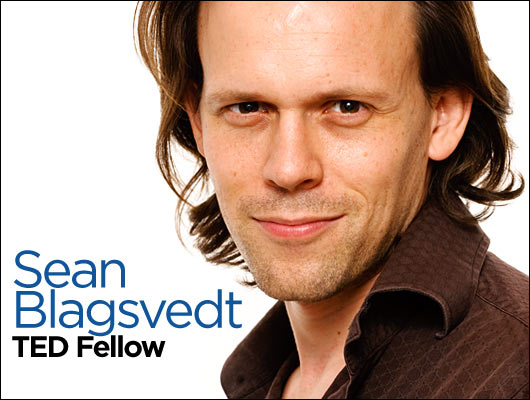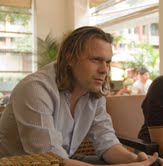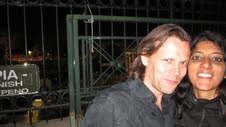What work of yours are you most proud of?
That would probably be what I’m doing now, which is Babajob, a web and mobile portal dedicated to helping informal-sector workers — at the bottom 90% of India and the developing world — find better jobs and opportunities over the phone.
I came across a Duke University paper while I was working at Microsoft Research that said people get out of poverty primarily via income diversification. People go into poverty due to healthcare-related debt, but they usually get out by doing things like changing jobs.
What this particular paper found was that those people with the strongest social networks could find out about jobs and could use that to land a better job that could potentially pull them out of poverty.
So at this point three years ago I had this insight that said, “Well, if only we could figure out some way to digitize all of this information, and figure out ways to make it scale, we might be able to catalyze the escape from poverty by connecting people with some more data about their work and the job opportunities they have.”
In some ways this is a very capitalist idea — this is about efficient markets. The idea is, if you give people more efficient markets and give them access to data, people will take advantage of this for their own rational self-interest, make better choices and raise their income.
So for the last few years of my life I’ve been dedicated to helping to try to solve this problem at scale. I think we’ve done a reasonable job thus far: We’ve had about 130,000 users. We’re in India right now, and we’re expanding to Indonesia. Our services are live on five mobile carriers and we add another 2,500 people every week. And there are thousands and thousands of people that have gotten jobs through our site. Those are all good things.
How does Babajob work, exactly?
We work with telephone companies in India that help us do marketing. So people will get a message or see a billboard that says something like, “Do you want a better-paying job close to your house? Text us your postal code, a job category, and your salary.” And then we send these folks messages every day.
So for about 2 cents per day (1 rupee), you get a new job posting that’s relevant to you. People then simply call up for the employers that are nearby them, or offering a wage that they’re interested in, or share a language that they also speak.
They can text us specific data, use the mobile web, or call into a call center. Additionally, if one person learns how to use Babajob on their phone, they can add their friends and manage their profile for them. Soon we’ll be launching an automated voice line for non-literate users so they can sign up, search and apply for jobs, and leave messages for employers as well.
In general most of the people who use our site are not unemployed. Some of them are straight out of school at the 18-year-old level. But a lot of people are doing it because they want a better job.
One of the curses of development in the developing world is that, as incomes rise, the cost of personal transportation gets cheaper (I’m sure you’ve heard of the “One-Lakh Car,” or the $2,500 car), and motorcycles have gotten cheaper every year in terms of real dollars — all of these things have contributed to really, really awful traffic that gets worse by the day. You cannot spend more than four hours a day commuting yourself to a job, right? So we see tremendous demand from people to get jobs that are close to them in cities. A better job can mean that commute time is reduced, in addition to earning a higher salary or getting a job with a higher status.
On average we find that people that get hired on our site make 20.1% more, and they reduce their commute times by 14 minutes a day.
We find that lots of job seekers will come from very economically depressed rural areas. In the last decade, 100 million people have moved from the countryside in India to urban centers. And they’re doing that because they’re looking for better job opportunities. But it’s not like there’s a big job bulletin board in the village listing every security-guard job in Delhi. If you live 500 miles outside of Delhi, you don’t really have any insights into which ones have 12-hour days versus 8-hour days, which ones pay $120 versus $70 per month, which ones have training, which ones will hire a guy that speaks Hindi versus Tamil versus Urdu. You can see how access to this data has a huge impact on the incomes and quality of life that people can have.
What are the strengths and weaknesses of Babajob?
As for our strengths, we’re very focused on the bottom end of the sector. We don’t make the assumption that someone can read when they use our site, and we certainly don’t make the assumption that they use a computer. I think we have more insight into what a job seeker who’s poor goes through, and how they actually do their search, than anybody.
As for our learning curve, we’ve certainly experimented in terms of business model. When we began, we had a more traditional job-site business model where we charged employers. We also found it somewhat difficult to scale. Because credit card penetration is low in India, collecting money is difficult — you need guys on bikes if you want to go around to every city in India. We’re also learning how to integrate well with these telephone companies, which are a great vehicle for scale, but have their own needs. That’s been a challenge, but I think something we’re getting better at every day.
I worked at Microsoft for nine years, and I’d say there are things you need to unlearn. A lot of the action in India in the last five years hasn’t been around the web, it’s been around these mobile-related services. The way that you scale those services is different than how you do that in the States.
As one of the three founders of Microsoft Research India, you were responsible for designing its office. Can you tell us about that experience?
It’s kind of a hobby. My parents actually paid my way through college by fixing up houses. They are very good at looking at a piece of real estate and thinking about how people interact with it, and what it might take to make it beautiful.
When I moved out with Microsoft to India in 2004, I was very excited to take on the challenge of being in charge of the building. It was terribly fun. I spent the previous six years working and thinking about things like: How do we make people more social with software? For example, in Office and Windows Messenger and Vista. To do that in an architectural space is also really fun.
A building has hierarchies that are built into it. As an architect of the space, you have to think about which one of these things you want. Do you give a presidential suite to the guy that runs the organization, or do you give him a cube like everybody else? These are real ways that values get reflected in a building. And it’s super fun to think about all those things.
And it was super fun to do that in an organization that was very empowered. And to also do that in a research organization where our PhD interns and workers were really the stars. We wanted to create an environment where people could think freely and collaborate and really felt it was the best possible place they could imagine to work.
I’m actually helping part-time with the design of their next building — it’s a lot of fun, I must say.
You’re a skilled musician. What led you to take up so many different instruments?
I grew up playing the piano. And then I was stuck in Boston for a winter and, long story short, I had to walk across the Longfellow Bridge uphill both ways in the snow every day and so I learned to play the harmonica to keep myself company and give myself something to do instead of concentrating on the cold. It’s kind of a solitary instrument and everybody usually teaches themselves.
It’s sort of a dream come true: My wife and I are in a band together, which is awesome. She is a VJ and I play a lot of bass. I like to play the bass because it makes other people dance. You feel this wonderful sense of empowerment when you’re playing something and suddenly people are dancing to it. The bass does that to people.
It’s very fun to play with her and the others in our band, the Manjunauts. We’ve played at rock music festivals here in India. It’s five people on laptops and I think I’m the only one who plays a real instrument. I’d say the style is avant-garde experimental.
What’s in the future for sites like yours?
I have a hope that more technology can be used for social good. I think TED is a part of that movement, and other companies are part of that: trying to create technological, scalable inventions that have a business model behind them and try to help the poorest of the world have a better life.
I think there are immense opportunities in terms of making markets more efficient. There are a lot of opportunities around ways to enable transparency to expose corrupt leaders and corrupt institutions as well. Another great problem that I think there’s a website or mobile site out there dying to solve is: how do I find a good school for my kid? This is a huge problem throughout the developing world.
At a metalevel, I would just hope that we get more people thinking creatively about this question: What are the scalable technology-based tools that solve problems of the world’s poorest people? All the innovation doesn’t need to happen in Silicon Valley. It’s needed everywhere. I’d really like to see this industry grow bigger. I think if it does, we have a chance to change the world in a big way for the better. TED has done a pretty good job of elevating the stature of some of the folks in the industry, but I’d love to see more of them come out.
There are many aspiring social entrepreneurs out there who are trying to take their passion and ideas to the next level. What is one piece of advice you would give to them based on your own experiences and successes?
Learn more about how to become a great social entrepreneur from all of the TED Fellows on the Case Foundation blog.
It may sound odd but you always have to think about business model and sustainability. If you really want to have an impact, you must think about how you’re going to pay the bills and keep your employees paid. That’s really the cleverness in all of this. How do you take all of this passion to do good in the world, but also apply a lot of business thinking in terms of how to sustain it and how to make it profitable so you can spread it out to more places.
I see a lot of social entrepreneurs not paying nearly enough attention to that when they start out. And then they ultimately fail and shrivel out.
How has TED Fellowship impacted your work?
Probably more than anything, I think it introduced me to a wider set of folks that I think are doing awesome work. The other TEDIndia Fellows are probably 100 of the coolest people that I could have met in India. I made a lot of friends and I feel honored to have met them. As a networking thing it’s above all the rest. I don’t even mean networking for business, but just networking to be inspired by other people. It’s funny, we started a kind of an informal support club for other social entrepreneur CEOs here. It’s fun to have other people that can relate to what you’re going through.



Comments (4)